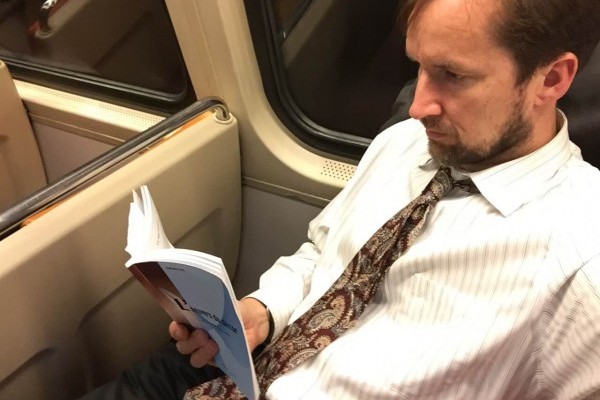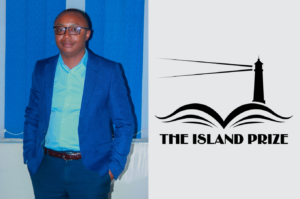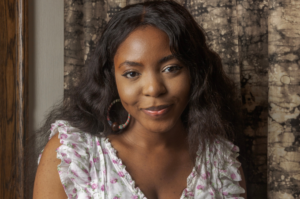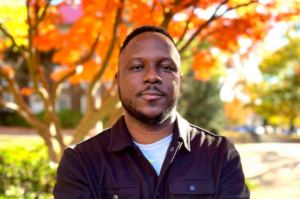David Evans is a friend and a fan of Brittle Paper, so we’ve always known that he loves to read. We just didn’t know how much of a super-reader he was until we stumbled upon his 300+ Amazon book reviews.
Evans takes time out of this busy life as an economist, a husband, and a father to read tons of books on all kinds of subjects and documents his experience in his lovely blog.
We wanted to know more about his life as an avid reader, what drives his love for books, how he finds the time, and what he thinks of African novels, so we had a chat with him.
This is not your quick read, over, and out interview. This is for the real book lovers. Evans explores his passion for reading and writing. He has a lot to say about fiction from the continent and shares his sentiments about Brittle Paper.
He also throws in…wait for this…30 book recommendations! Amazing right?
Enjoy!
300+ reviews, when and how did it all start? How do you find the time?
I love to read but my memory is terrible. What have I read? What did I think of it? What did I learn from it? About a decade ago, I decided to write at least a short review of each book I consumed. (I consume books, via the printed page, the screen of my phone, and the earphones pumping sweet narration straight into my brain.) That way, I can preserve what I thought of the book. It also gives me something concrete to share with friends and family: “THIS is why I think you should read this book.”
I set a series of book goals to guide my reading. Right now, I’m trying to consume at least one book by an African author each month (6 done so far this year; so much fun!) and one book in a non-English language each month (falling behind, but 7 so far this year). With my siblings, each year we draw up a 25-square bingo board with different book categories and try to consume one book from each; this year’s board includes a science book (Arbesman’s The Half-Life of Facts), a Western (Wister’s The Virginian), an essay collection (Gaffigan’s Food: A Love Story), a play (Mamet’s Romance), a young adult book (Woodson’s Brown Girl Dreaming). For 2015, I only have the “at least 500 years old” book left (I’m working on Ian McKellen’s reading of The Odyssey). Finding the time to write the reviews is the toughest part. Last week I reviewed Aminatta Forna’s fabulous The Memory of Loss at 4 a.m. when I couldn’t sleep.
Is there a reading/reviewing ritual?
Anywhere and everywhere. I listen to books while running and doing dishes. I read while waiting for the bus and commuting to work. Anytime I have a couple of minutes. With three kids, it’s harder to find the time to just sit and read for long periods. But that’s substituted with reading novels – and especially graphic novels – aloud to the kiddos, which is a total blast.
How does the fiction from the continent help put the issues you encounter as an economist in perspective?
In my work, I seek to help governments and international partners to base public programs on good evidence: What actually works to reduce poverty? What works to help Ugandan or South African children get a good education? As I read literature by African writers, I encounter universal themes, but I also feel like I’ve had a great conversation with a thoughtful resident. What a privilege to peek into poor communities in Zimbabwe with NoViolet Bulawayo, into the struggles of middle class families in Nigeria with Chimamanda Adichie, or into mental health treatment centers in post-war Sierra Leone with Aminatta Forna. Taiye Selasi, earlier this year, poked holes in the idea that we can treat African writers as anthropologists or native informants. Lauren Beukes, in an interview about Broken Monsters (recommended to me by Brittle Paper), talked about the pressure that “readers and critics might want you to be representative of something.” They are right: No African writer should be obligated to represent anything beyond what they want to write. But I still believe that I gain a sense of place from one author’s and many characters’ perspectives, and that sense of place widens and deepens the perspectives I take into my work.
Are there African stories that you’d love to read more of?
I love the variety of stories that I’m reading now, from the experiences of the poor (in the first half of Bulawayo’s We Need New Names) to those of the middle and upper classes (in Adichie’s Americanah or Forna’s The Memory of Love).
One of my favorite novels of all time is Adichie’s Half of a Yellow Sun. I was embarrassingly ignorant of the Biafran War, and that novel really opened my eyes. Mofolo’s Chaka, about the Zulu king (again, recommended to me by Brittle Paper), felt more mythological, but it was still a delightful peek into another time. I’d love to continue seeing stories that bring historical episodes to life.
I’d also enjoy seeing more novel-length fantasy and science fiction. Nnedi Okorafor is doing interesting work there (I read and liked Who Fears Death?), and I’d like to see more voices exploring humanity through magic and invention across the continent.
Has there been any standout book-to-movie adaptation for you?
I haven’t seen too many adaptations of African fiction. I admire when a filmmaker can make a movie that is different but still lovely. That’s how I felt about Nick Hornby’s About a Boy and the movie adaptation. I do think I set myself up for disappointment when I watch adaptations of books that are dear to me. When I was a child, I fell in love with C.S. Lewis’s Narnia novels, and I just recently watched the first three films with my kids after reading the books aloud with them. The second and third films, Prince Caspian and The Voyage of the Dawn Treader, both departed heavily from the source material and so disappointed me, but mostly just because they weren’t the films I wanted.
What book did you close unfinished and very return to?
I rarely close books unfinished on purpose. I tend to put them down and then never get around to picking them up again. I have Angolan writer Pepetela’s Jaime Bunda: Secret Agent on my phone in Portuguese, started it, loved the rhythm, but just got drawn into other books. I hope I’ll get back to it eventually.
Which two authors would you like to see collaborate on a project?
Basically, I’d love to see Chimamanda Adichie team up with anybody else. With Lauren Beukes for a thriller? With Neal Gaiman for a fantasy? With Carlos Ruiz Zafón for a period, fantastical, bibliocentric thriller?
Have there been occasions when an author has reached out for good or bad?
Another time, just last month, I reviewed Stephan Eirik Clark’s novel Sweetness #9, speculating on one element of the novel that I didn’t quite understand. After I tweeted the review – tagging the author – he tweeted back the most insightful response. It was radical!
More than authors, I have heard from many, many students. Years ago, I posted a short review of Senegalese writer Aminata Sow Fall’s The Beggars’ Strike. It must be on some secondary school curricula, for over the years, I’ve received many comments on the blog post like, “pls can u summarize the entire book” or “can you please sent me the summary of the novel along with its themes, style of narration and characterization.”
The most memorable books you ever read were…
This is an impossible question! Among African fiction, Chimamanda Adichie’s Half of a Yellow Sun is the book I have most consistently recommended to people. Others that I’ve recommended repeatedly are Chinua Achebe’s A Man of the People, which is a great, short introduction to corrupt politics; and Ngugi wa Thiong’o’s Wizard of the Crow, which beautifully mixes politics and love and magic and farce.
Two other books that have stayed with me for years are Rohinton Mistry’s A Fine Balance, about hope and desperation amidst crushing poverty in India, and Julia Alvarez’s In the Time of the Butterflies, about three sister activists against the Trujillo dictatorship in the Dominican Republic.
Kindle or Paper, which do you prefer?
I love them both. I love print books so that I can fill the margins with notes to myself. I especially love print for books in French, Spanish, or Portuguese, so I can jot the definitions of the words I don’t know. Right now I’m carrying the print version Safiatou Ba’s L’envers du décor (Behind the scenes), a collection of short stories from Mali, and the margins are crammed with translations as well as notes to remember a piece of wisdom or to use a particular romantic line with my wife.
I have the Kindle, Nook, and iBook apps on my phone so I have a book anytime, anywhere. It also means I can get access to books that are only available on one platform. On my phone right now, I have Mia Couto’s Sleepwalking Land – recommended to me by Brittle Paper, some non-fiction (Walter Mischel’s The Marshmallow Test) and the unpublished novel of a friend.
I also love audiobooks, and I love that more African fiction is coming out in that format. I’ve recently listened to Lauren Beukes, Aminatta Forna, Chimamanda Adichie in audiobook. I currently have Yejide Kilanko’s Daughters Who Walk This Path on audiobook on my phone.
What do you do with books you’ve read? Give out or shelve?
Historically, I’ve shelved them, particularly because they’re filled with marginalia. But I’ve been trying to ease myself into giving more away, especially books that I enjoyed but don’t expect to come back to right away. It’s such a pleasure to hand someone a book and have them love it, even if they sometimes make fun of my wacky margin notes. One friend came back questioning my notes linking a biography of an American figure to a scene in Tolkien’s The Return of the King.
If you were to write a one-sentence review of Brittle Paper…
Brittle Paper is a thoughtful, tireless champion and cheerleader for African voices in literature.










seun November 12, 2015 11:41
I enjoyed reading this interview! Mr Evans, you seem like the kind of reader I would eventually turn out to be! Yes, we read The Beggars' Strike in junior secondary school, which, for me was about eight years ago